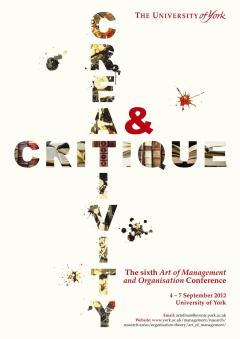Date: 1st-4th September 2012
Hosted by: The York Management School, University of York
Conference Theme: Creativity and Critique

Creativity has always been synonymous with the arts, but not with management. Indeed, managing creativity has been constructed as a perennial problem for organizations, creatives not being seen as comfortable with bureaucracy, nor willing to sacrifice autonomy. But recently, the entrepreneurial spirit of creatives has been mythologised and the creative industries have been elevated to the status of role model for the knowledge economy. Everyone is supposed to be creative now. The world of work is equally one of play and invention, we are told – if, in the current context we are lucky enough to have work, if not… create it. Is it really such a problem if we’re not creative? Do we all have to be leaders/managers/entrepreneurs too?
Management and organization, in theory and practice, has in the past tended to neglect the affective dimensions of work, and has often produced, as a by-product of organizing, effective ways of killing creativity – whether that characteristic of people working in creative roles, or that more generally distributed in ways that organizations only reluctantly recognised, and delimited, through such efforts as quality initiatives. But creativity also kills – the moral and ethical dimensions, and even the dark side, of creativity, from the human genome project to genocide, remain relatively under-explored. And art as kitsch produces a generalised deadening effect that leaves the world culturally safe for capitalism, or totalitarianism. We look on, as Barbara Ehrenreich puts it, “bright-sided”, sentimentally reaffirmed as social beings with our humanity safely in wraps.
Conference Highlights
2012 saw AoMO host 9 specialized streams that focus around the Creativity and Critique theme and a host of dynamic and thought-provoking workshops, performances, exhibitions and installations.
Exhibitions included:
- Ann Rippin’s magnificent quilting exhibition that explored the construction and maintenance of women’s identities through a number of ‘branded’ aesthetics including The Body Shop and Laura Ashley (read more here: https://annjrippin.wordpress.com/2012/09/15/the-york-exhibiiton/)
- Abigail Schoneboom’s photographic exhibition of focused on the ways in which allotments are intertwined with contemporary working lives, exploring the connection between allotment activity and the idea of work.
- ‘Unveiling Restructuring Effects: a Demo’ by ABRIR An exhibition between art and research about the hidden processes, mental representations, temporal and humane dimensions underlying the dis-organizational phenomena of restructuring and its destructive effects
- A pilot film exploring recurring motifs in the life and relationships of Edvard Munch by Rune Bjerke
- ‘City of Thought’ by Daved Barry, Henrik Schrat & Cathryn Lloyd that invited participants to experiment and consider new tools and strategies for taking concepts, theories, and methodologies presented in their papers and to explore other tangible ways to present that material, engage people, and transfer knowledge and understanding.
- ‘Aire’ by Jane Gavan was hosted in the 360-degree projection space in the Ron Cooke Hub, created light filled spaces that filtered or screened the outside world to enable those resting inside the ‘Aire’ to think, or talk, or create with reduced distraction from the outside world.
Other highlights included:
- Presentation and discussion of the 2012 TV documentary Slavery: A 21st Century Evil with director of 3 of the programmes in the series, David Hickman, and a discussion led by Prof Bill Cooke, author of the first paper on slavery and management.
- Prof Steve Taylor and company offered a superb staged reading of his current play ‘The Invisible Foot’
- Debate plenary exploring ‘Does Management Needs the Arts?’ included a panel of international experts Chris Bilton, Pierre Guillet de Monthoux and Philip Spedding.
Gala Dinner Event
The Art of Management & Organization was very proud to play host to a very special academic- artistic collaboration in the magnificent surroundings of the National Railway Museum, York, UK. Newly discovered industrial songs by Professor Marek Korczynski were introduced and then performed by the multi-award winning singer Eliza Carthy with Saul Rose. This saw many of the AoMO community up on their feet dancing before dinner! You can find more information on Marek’s work on the Rhythms of Labour at www.rhythmsoflabour.com.
Related Downloads
Gallery






